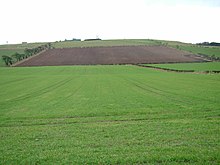Battle of Flodden Field
| date | September 9, 1513 |
|---|---|
| place | near Branxton in Northumberland , England |
| output | Decisive English victory Death of the Scottish King |
| Parties to the conflict | |
|---|---|
| Commander | |
| Troop strength | |
| about 25,000 men | about 30,000 men |
| losses | |
|
1,000 to 1,500 dead |
10,000 to 12,000 fallen |
League of Cambrai (1508–1510)
Agnadello - Padua - Polesella - Mirandola
Holy League (1510 / 11–1516)
Brescia - Ravenna - Navarra - St. Mathieu - Novara - Guinegate - Dijon - Flodden Field - La Motta - Marignano
The Battle of Flodden Field took place on September 9, 1513 near Branxton in the northern English county of Northumberland not far from the border with Scotland. An invading Scottish army led by King James IV met an English army led by Thomas Howard, 2nd Duke of Norfolk . The battle ended with a crushing defeat for the Scots and the death of the Scottish king.
background
England was involved in a larger conflict as a member of the Holy League and fought against France on the side of the Swiss, of Spain, of the Roman-German Emperor Maximilian I and of Pope Julius II . Scotland was not directly involved in this continental European dispute, but was an old ally of France within the Auld Alliance .
The conflict began when James IV took advantage of Henry VIII's absence and declared war on England. This should bind the troops of the English king who were on a campaign against the troops of the French king Louis XII. found.
Jacob invaded England with an army of over 60,000 men. When he finally reached the battlefield, his troops were only about 30,000 men, as many soldiers had deserted or were killed in minor skirmishes . So the Scots faced an English army of roughly equal strength.
The battle itself took place near the village of Branxton in Northumberland , about 3 miles from the Scottish border. Hence the alternate name of the battle, Battle of Branxton . At Flodden the Scots had pitched their army camp , which is 3.5 km southeast of Branxton. It would be the last battle to take place in Northumberland.
Course of the battle
The battle ended days of maneuvers. Eventually the English managed to cross the River Till and get behind the Scottish positions. The Scottish cannons opened fire. But because of the poor training of the gunners, the heavy artillery and the wet gunpowder, the Scots mostly missed their target.
The more agile and much better trained English artillery fired back with deadly precision, driving the Scottish artillerymen off the field. The English cannons and archers then concentrated their fire on the Scottish pikemen . The heavy losses enticed the Scots to storm down the hill to get the English within their reach. The English halberdiers , however, had little trouble against the Scottish spears. These had changed little since the Battle of Bannockburn and were actually better suited against a cavalry attack than in an infantry battle .
In the bloody skirmish, the bulkheads were finally surrounded and wiped out; the Scottish king, many high-ranking nobles and over 10,000 soldiers were killed. The English losses are estimated at 1,000 to 1,500 men.
Aftermath
From a tactical point of view, this battle was one of the first clashes in the British Isles in which the artillery played a decisive role, but also one of the last in which the famous English archers made a decisive contribution.
Thomas Howard, 1st Earl of Surrey , was Lieutenant General and largely responsible for the English victory. Henry VIII subsequently appointed him Duke of Norfolk . Sir Edward Stanley , who is popularly attributed to the killing of the Scottish King, was made Knight of the Order of the Garter for his services in battle . There was hardly a noble family in Scotland that did not lose at least one member in the Battle of Flodden Field. The bagpipe song Flowers of the Forest (in Scots ) is dedicated to these and the other dead :
We'll here nae mair lilting at our ewe milking,
Women and bairns are heartless and wae,
Sighing and moaning on a ilka green loaning,
The flooers o 'the forest are a wede away.
German:
We will never sing again during our evening milking,
women and children are heartless and sore .
Sighs and wails on every green meadow,
the flowers of the forest have withered.
Web links
- flodden.net (English)
Coordinates: 55 ° 37 ′ 36.9 " N , 2 ° 10 ′ 31.1" W.
